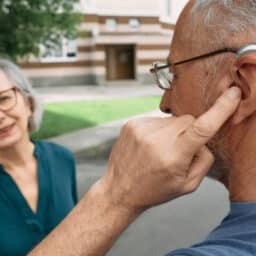Communicating with Your Valentine with Hearing Loss
Valentine’s Day is February 14th, and perhaps you and your Valentine have some exciting plans together. If your Valentine has hearing loss, it can make communication difficult, even in the most romantic settings. Let’s take this opportunity to discuss communication strategies that can help you and your Valentine communicate better, on Valentine’s Day and every…
Sounds You May Not Realize Are Hazardous to Hearing
You probably know that loud noises can damage your hearing and cause hearing loss. This is known as noise-induced hearing loss (NIHL), and it’s estimated that as many as 40 million American adults have some degree of NIHL. But NIHL isn’t just caused by a single gunshot or one loud rock concert; prolonged exposure to…
Hearing Aids and the Occlusion Effect
Fewer than 30% of the 28.8 million American adults who could benefit from hearing aids wear them. One major reason for this is the occlusion effect, which is when your voice sounds echoey or booming in your own head due to an obstruction in the ear. The occlusion effect can be somewhat uncomfortable and may…
Can Riding My Motorcycle Affect My Hearing?
If you ride a motorcycle, you’re right to worry about your hearing; motorcyclists are at an increased risk of hearing loss. You may be surprised, however, to learn that the main culprit for hearing loss isn’t the loud engine of the machine, but the wind noise inside the helmet. How Loud Is Wind Noise? Just…
Gulf Coast Audiology – Patient-First Hearing Care
Our very own Dr. Drianis Duran, AuD was featured recently in an article from Florida Health Care News [read full article]. Her patient-first approach, professionalism and collaborative care were put on display through the story of Michael Lancellot, a retired executive who faced significant hearing challenges, from sensorineural hearing loss to sudden hearing loss to…
How to Monitor Your Hearing Loss When You Live Alone
Hearing loss happens gradually; sometimes you don’t even notice it’s happening. Oftentimes, partners or family members who live with you notice declining hearing ability first, but what if you live alone? If you live alone, you may not realize just how much your hearing loss has progressed. That’s why it’s important to take proactive steps…
Should I Use a Hearing Aid App?
Technology improves every year, and that is certainly true for hearing aid technology. Modern hearing aids can use computer chips, digital feedback reduction, and directional microphones to get users closer than ever to pre-hearing loss hearing. Hearing aid users can also find dedicated smartphone apps for their hearing aids, and these apps can be incredibly…
Can Large or Swollen Lymph Nodes Affect Hearing?
Your lymph nodes are small, bean-shaped glands that are a critical part of the immune system. You have hundreds of them in clusters throughout your body: under your chin, in your armpits, in your groin and behind your ear. Usually, lymph nodes are small enough that you can’t feel them even though they’re just under…
Why Does Feedback Occur When Using Hearing Aids?

When a hearing aid user experiences feedback, they’re experiencing the same phenomenon that occurs when a microphone is too close to a speaker. You may be familiar with the loud metallic sound it produces, and the wincing face of the speaker who experiences it. When hearing aid microphones pick up amplified sound from the hearing…
Exploring the Relationship Between Anemia and Hearing Loss

About 15% of adults in the United States report experiencing some form of hearing difficulty each year. While hearing loss can arise from various causes, including genetics, noise exposure and aging, emerging studies indicate that underlying health conditions, such as anemia, may also play a role in auditory health. Understanding Anemia Anemia is a condition…
